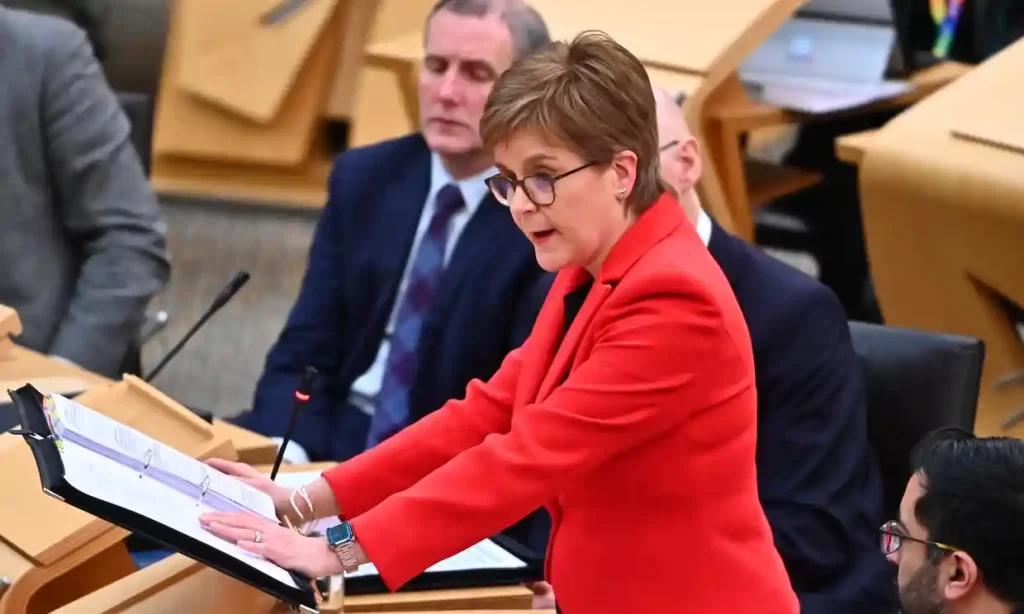Nicola Sturgeon’s resignation could prompt a major rethink around her plans to fight the next UK general election as a de facto referendum on independence, the Scottish National party’s leader in Westminster has suggested.
After the shock announcement of the first minister’s departure on Wednesday, Stephen Flynn said the special conference due to be held next month on Sturgeon’s plan should be pushed back to give the new leader time to set out their intentions.
“I think it’s sensible that we do hit the pause button on that conference and allow the new leader the opportunity to set out their vision,” he told Sky News.
That proposal was supported by Mike Russell, the party’s president, who told BBC Scotland on Thursday: “There is a question to be asked as to whether that should be postponed whilst the leader comes into place.”
Russell, one of the SNP’s most senior figures, said Sturgeon had touched on that prospect in her speech on Wednesday. Although he supported Sturgeon’s stance on how to fight the next general election, he said: “I think it’s a matter that needs to be discussed.”
The conference was organised to approve Sturgeon’s highly controversial proposal but it is one Flynn and others inside the SNP have widely criticised, and is deeply unpopular with voters. There is speculation at Holyrood it may now be repurposed as a leadership hustings event for SNP members in the Edinburgh area.
Jostling will begin in earnest among potential replacements for Sturgeon, who served as the first female first minister and spent decades in frontline politics – outlasting all the leaders both in Holyrood and Westminster she worked alongside.
The SNP’s national executive committee is scheduled to meet online at 6.30pm on Thursday to discuss the timing for a leadership contest. Russell has said he expects that process to be “shortened” and for there to be a “contested election”.
Flynn, who became Westminster leader of the SNP in December, said party figures were “going to be discussing and debating the merits” of the treatment of the next general election as a de facto referendum.
But he added: “I personally think that party conference should be paused, for obvious reasons. I think the new leader should have the opportunity and indeed the space to set out their position, their values and their intentions going forward.”
Asked if the position of treating the next general election as a de facto referendum was “dead” on BBC Radio 4’s Today programme on Thursday, he said the party should give the next leader space to set out their “agenda”.
As speculation mounted about who could replace Sturgeon, Flynn said he had “not seen anyone throw their name in the ring yet” and declined to say who he would most like to see lead the SNP.
Flynn ruled out taking up “the big task” himself, and said he had “no doubt there’ll be a number who will consider themselves as being capable of taking on the challenge”.
While Sturgeon has said she will remain as first minister until her successor is chosen, the SNP’s national executive committee has not yet published a timetable for the election of its next party leader.
Early possible contenders to succeed Sturgeon include Keith Brown, the SNP’s deputy leader; the finance and economy secretary, Kate Forbes; the constitution secretary and former Westminster leader of the party, Angus Robertson; the deputy first minister, John Swinney; and the health secretary, Humza Yousaf.
A protracted leadership election, given pressures on the NHS and the cost of living crisis, is likely to be capitalised on by opposition parties. Douglas Ross, the leader of the Scottish Conservatives, said the Scottish government should focus on issues that “really matter to people”.
Kenny MacAskill, the deputy leader of the pro-Scottish independence Alba party, argued on Thursday that Sturgeon’s departure should lead to a recognition that the cause was about more than “one individual or one party”.
He told the Today programme the SNP was “one part of the independence movement” and should use Sturgeon’s departure “to recalibrate, to recognise that there have been strategic flaws, to look for a new direction”.


